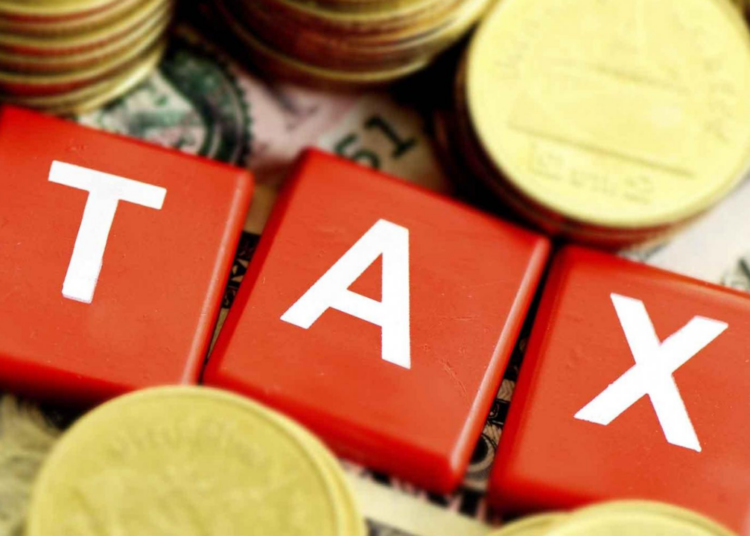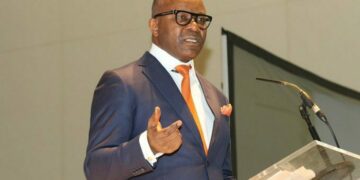The federal government, through the Presidential Committee on Fiscal Policy and Tax Reforms has disclosed plans to cut down the number of taxes payable in Nigeria to less than ten.
Taiwo Oyedele, chairman of the Presidential Committee on Fiscal Policy and Tax Reforms stated this in Abuja on Tuesday, during the 53rd annual conference of the institute of chartered accountants of Nigeria.
According to Oyedele, over 62 taxes were officially being collected at the different levels of government in the country. This according to him was a burden on Nigeria business operators.
He also decried the several informal taxes being collected across the country,
“At the federal level. The list is somewhere close to 16 officially at the state level 25 Local Government 21 But this is just the beginning of the story. The story is incomplete. Until you are add the over 108 informal taxes collected all over the place, sometimes by non state actors that have been empowered, either passively or actively by government.
“In fact, we have bicycle tax, and wheelborrow tax in Nigeria. I think if you’re looking for the definition of wickedness, it will be to find a man who is struggling to make ends meet pushing their wheelbarrow in the sun and say, you have not paid your tax.
“What I want and hope to achieve is the reduction of the number taxes to less than 10, yes we want a single digit, and also we want to cut down revenue collection agencies to one for each of tier of government. With this, the federal government have one revenue collection agency, same for state and local government. So that they can focus on their primary mandate of making life easier for citizens.
Speaking further, Oyedele noted that among the fundamental issues that needs to be addressed in the Nigeria include; poverty, poor revenue, high debt, decline in investment and the increasing rate of youths migration from the country.
He explained that the multi dimensional poverty index, which revealed that over 133 million Nigerians were multidimensionally poor, was calculated based on access to healthcare, education, security among other factors.
“We have widespread poverty, government’s revenue is low and as a consequence, public debt is high. And the debt service to revenue ratio is one of the highest we’ve seen anywhere in the world. Investment is declining and you cannot have economic growth without investments.
“Whether they are domestic or international, we’re not attracting foreign investment, and we’re not mobilising domestic investment enough. Many of the existing investors are leaving and those who are left are asking questions; can we continue?
“So these are fundamental issues we must address our people also leaving the country as a percentage of the population not too far. From my view is that even if it’s only 1 percent, to the extent that they are leaving because they feel frustrated, then we should be concerned ” he said.
For Oyedele, in order to address poverty in the country, there was need for the government to measure public expenditure to GDP. “We need to at how much of what you collected from the people have you given back to them? And why giving it back to them, it is important to note in what ways are you giving it back?
” For example, if you decide to build high rises, airports, flyovers when the people lack drinking water, basic education, an there’s no road from the farm to the market. It’s wrong priority an it is as good as the money being stolen, or the money being wasted. So the problem is not with tax itself. It is what you do with the taxes. You have collected.”
In his remarks, Mathew Gbonjubola, the Group Lead Special Tax Operations Group at the FIRS, noted that tax revenues have continued to account for about 90 percent of the total government revenue.
For him, there a need for the government to consider the best approach to ensure effective revenue mobilization and administration, adding that while it may be easy to modify the revenue collection processes at the federal levels, same level of certainty approach may not be possible at the sub national.
“So these are the difficult discussions to have. Within Lagos or within Abuja here, I have seen some people holding sticks standing on the road. And then I ask, Who are these people? They say, they’re local government people collecting revenue.
“And so if you want to get rid of such people, it is going to be a hard if the chairman of the local government do not agree with you, if the traditional ruler within the area does not agree with you, if the governor in that state does not agree with you, and so for me, that is the starting point.
“So we begin to ask ourselves, with cost benefits in our mind and say, which one gives us a better approach?
Speaking further, Gbonjubola said that the FIRS has recorded positive impact of automation and digitalization of the tax administrative processes, adding that many new initiatives were being developed to enhance tax revenue collection in Nigeria.
He said, “the current system being used by the federal revenue service was developed in house by officers of the service because we were able to design our own processes by ourselves. Quite a number of new modules are currently in the works. For example, we have new VAT module which was unveiled some time ago which again due to various interventions and input from stakeholders we have reviewed.
“Part of what is going to come hopefully in a few months, again will boost ability to make foreign payments directly on the FIRS portal and then you get your receipts to be generated for you.
“We are hoping that very soon we’ll be able to open the portal for you to change your profiles. To do a number of maintenance by yourself and change your address you can change your telephone numbers and things like that. We are coming to that and we are also doing a lot with our sister government agencies as regards data.
He disclosed that the Agency currently shares relevant data with several organisation, including the central bank of Nigeria, the Financial Intelligence Unit, as well as adopting practices that enables tracking and reporting of incomes earned by Nigerians in the diaspora.





